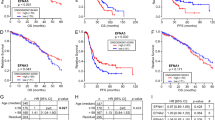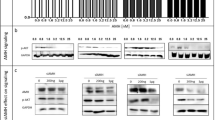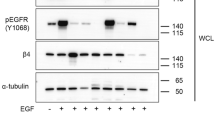Abstract
Previous investigators have noted that certain ovarian cancer cell lines secrete and respond to transforming growth factor-alpha (TGF-alpha), suggesting that endogenous activation of the epidermal growth factor (EGF) receptor through autocrine or paracrine mechanisms might contribute to the proliferative response. In order to determine whether autocrine stimulation was partly responsible for the proliferative response in ovarian cancer, we investigated whether the EGF receptor expressed by ovarian cancer cell lines was constitutively activated as assessed by the presence of tyrosine phosphorylation. A specific anti-phosphotyrosine antibody was used in conjunction with an immunoblotting technique in order to detect EGF receptor phosphorylation in ovarian cancer cell lines in the absence and presence of exogenous EGF. The effects of neutralising anti-EGF receptor antibody on the proliferation of ovarian cancer cell lines was also examined. We found no evidence for constitutive tyrosine phosphorylation of the p170 EGF receptor in eight epithelial ovarian cancer cell lines tested, although each line demonstrated inducible phosphorylation in response to exogenous EGF. The absence of constitutive EGF receptor activation was also noted when cells were grown under high density conditions, thus excluding a role for membrane-bound EGF or TGF-alpha in this process. Media conditioned by five ovarian cancer cell lines, as well as malignant ascites obtained from 12 different ovarian cancer patients, were not capable of stimulating EGF receptor phosphorylation. Finally, the proliferation of ovarian cancer cell lines was not significantly inhibited in the presence of neutralising anti-EGF receptor antibody. These data suggest that EGF receptor activation through autocrine pathways is not a major mechanism for the growth of many ovarian cancer cell lines. Other pathways of signal transduction which bypass the requirement for EGF receptor activation may be important in the proliferation for ovarian cancer cells. Such EGF receptor-independent pathways may limit the effectiveness of strategies designed to inhibit ovarian cancer cell growth through disruption of EGF receptor function.
This is a preview of subscription content, access via your institution
Access options
Subscribe to this journal
Receive 24 print issues and online access
$259.00 per year
only $10.79 per issue
Buy this article
- Purchase on Springer Link
- Instant access to full article PDF
Prices may be subject to local taxes which are calculated during checkout
Similar content being viewed by others
Author information
Authors and Affiliations
Rights and permissions
About this article
Cite this article
Ottensmeier, C., Swanson, L., Strobel, T. et al. Absence of constitutive EGF receptor activation in ovarian cancer cell lines. Br J Cancer 74, 446–452 (1996). https://doi.org/10.1038/bjc.1996.379
Issue Date:
DOI: https://doi.org/10.1038/bjc.1996.379
This article is cited by
-
A modified medium that significantly improves the growth of human normal ovarian surface epithelial (OSE) cells in vitro
Laboratory Investigation (2004)



